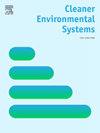Financial feasibility and optimization of anaerobic digestion systems for sustainable waste management: A comprehensive global analysis
IF 4.9
Q2 ENGINEERING, ENVIRONMENTAL
引用次数: 0
Abstract
Effective management of organic waste plays a vital role in addressing environmental challenges and advancing sustainable development goals. This review article provides a comprehensive financial assessment of anaerobic digestion (AD) systems for treating the organic fraction of municipal solid waste (OFMSW). Previous studies on AD systems have largely been confined to local case studies with findings that cannot be generalized beyond their specific regions, and they have often overlooked the combined influence of technical, economic, and political factors on financial performance. The study begins by identifying the gaps and limitations in existing financial models for AD systems. It then develops an enhanced financial framework and uses scenario-based analyses to assess the financial feasibility of AD technologies. The model outputs indicate that the financial feasibility of AD systems is heavily influenced by national energy policies and environmental regulations. It is revealed that insufficient government support for energy tariffs—particularly in countries experiencing economic instability—serves as a major barrier to the cost-effectiveness of AD systems. In contrast, in economically stable regions, the financial sustainability of these systems is primarily challenged by stringent environmental regulations specifically related to digestate disposal. To overcome these challenges and further strengthen the financial performance of AD systems, future research should prioritize AI-driven optimization to enhance operational efficiency, reduce costs, increase energy output, and ultimately improve financial sustainability. By addressing existing barriers and proposing actionable recommendations, this review aims to foster the adoption of AD technologies as a cornerstone of sustainable waste management practices.
经济可行性和优化厌氧消化系统的可持续废物管理:一个全面的全球分析
有效管理有机废物对应对环境挑战和推进可持续发展目标至关重要。本文综述了厌氧消化(AD)系统处理城市固体废物(OFMSW)有机部分的综合财务评估。以前对AD系统的研究主要局限于当地的案例研究,其结果不能推广到特定区域之外,而且往往忽视了技术、经济和政治因素对财务绩效的综合影响。该研究首先确定了AD系统现有财务模型中的差距和局限性。然后,它开发了一个增强的财务框架,并使用基于场景的分析来评估AD技术的财务可行性。模型结果表明,可持续发展系统的财务可行性受到国家能源政策和环境法规的严重影响。研究表明,政府对能源关税的支持不足——特别是在经历经济不稳定的国家——是AD系统成本效益的主要障碍。相比之下,在经济稳定的地区,这些系统的财务可持续性主要受到严格的环境法规的挑战,特别是与消化处理有关的法规。为了克服这些挑战并进一步加强防空系统的财务绩效,未来的研究应优先考虑人工智能驱动的优化,以提高运营效率、降低成本、增加能源产出,最终提高财务可持续性。通过解决现有的障碍和提出可行的建议,本审查旨在促进采用可持续废物管理技术,作为可持续废物管理做法的基石。
本文章由计算机程序翻译,如有差异,请以英文原文为准。
求助全文
约1分钟内获得全文
求助全文
来源期刊

Cleaner Environmental Systems
Environmental Science-Environmental Science (miscellaneous)
CiteScore
7.80
自引率
0.00%
发文量
32
审稿时长
52 days
 求助内容:
求助内容: 应助结果提醒方式:
应助结果提醒方式:


